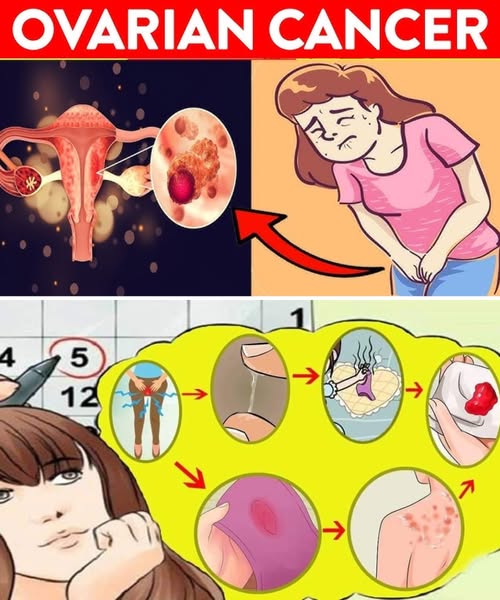Introduction
Ovarian cancer is often called the “silent killer” because its symptoms can be subtle, vague, and easily mistaken for less serious health issues. Unfortunately, by the time many women recognize the warning signs, the disease may have already advanced. According to the American Cancer Society, ovarian cancer ranks fifth in cancer deaths among women, accounting for more deaths than any other cancer of the female reproductive system.
But here’s the good news: early detection dramatically increases survival rates. Women diagnosed at an early stage have a 5-year survival rate of over 90%. This is why recognizing the symptoms is critical.
In this article, we’ll uncover the 9 most common ovarian cancer signs you should never ignore, explain why they matter, and answer frequently asked questions to help you make informed health decisions.
1. Persistent Bloating
Almost every woman experiences bloating occasionally. But persistent or severe bloating that lasts for more than a few weeks can be a red flag.
- Why it matters: Ovarian tumors can cause swelling in the abdomen by pressing against internal organs.
- When to act: If bloating does not improve with lifestyle changes (diet, hydration, exercise), it’s time to consult a doctor.
2. Abdominal or Pelvic Pain
Recurring pain in the pelvic area, lower back, or abdomen should never be brushed off as “just cramps.”
- Why it matters: This discomfort may be due to ovarian masses pressing on nerves or tissues.
- Tip: Keep a symptom diary noting the frequency and intensity. Doctors often rely on patterns to diagnose ovarian cancer.
3. Difficulty Eating or Feeling Full Quickly
If you suddenly find yourself unable to finish meals or feeling full after just a few bites, pay attention.
- Why it matters: This may indicate a tumor affecting digestion and stomach capacity.
- Supporting fact: The Ovarian Cancer Research Alliance notes that feeling full too quickly is one of the hallmark early signs of ovarian cancer.
4. Urinary Urgency or Frequency
Do you feel like you constantly need to run to the bathroom?
- Why it matters: Tumors in the pelvic region may put pressure on the bladder, causing frequent urination or urgency.
- Note: This is often misdiagnosed as a urinary tract infection (UTI), but unlike UTIs, ovarian cancer symptoms do not improve with antibiotics.
5. Changes in Bowel Habits
Unexplained constipation, diarrhea, or other gastrointestinal changes lasting more than a few weeks can signal ovarian cancer.
- Why it matters: Tumors may press against the intestines, disrupting normal digestion.
- Key point: Sudden digestive issues in women over 40 should never be dismissed as “just diet-related.”
6. Fatigue That Doesn’t Go Away
We all feel tired from time to time, but chronic fatigue that doesn’t improve with rest is concerning.
- Why it matters: Cancer drains the body’s energy as it spreads, and persistent exhaustion is a tell-tale sign.
- Research insight: Studies suggest that fatigue is present in over 60% of women diagnosed with ovarian cancer.
7. Unexplained Weight Loss or Weight Gain
Sudden weight loss may look appealing at first, but when unexplained, it could be dangerous. On the other hand, some women experience rapid weight gain due to fluid buildup in the abdomen (ascites).
- Why it matters: Both can indicate abnormal growth or spread of ovarian cancer.
- Tip: If your weight fluctuates dramatically without changes to diet or activity, seek medical advice.
8. Pain During Intercourse
Dyspareunia (painful intercourse) is not just an intimate inconvenience—it could be a sign of something more serious.
- Why it matters: Ovarian tumors or swelling in the pelvic region can make sexual activity painful.
- Takeaway: Don’t normalize discomfort during sex; instead, get checked by a gynecologist.
9. Menstrual Changes or Post-Menopausal Bleeding
Irregular cycles, heavier-than-normal bleeding, or spotting after menopause should not be ignored.
- Why it matters: These can indicate hormonal changes triggered by ovarian cancer.
- Action step: Any abnormal bleeding warrants immediate medical evaluation.
Frequently Asked Questions (FAQs)
1. Who is most at risk of ovarian cancer?
Women over 50, especially those with a family history of ovarian or breast cancer, are at a higher risk. BRCA1 and BRCA2 genetic mutations also significantly increase the likelihood of developing ovarian cancer.
2. Can ovarian cancer be detected early?
Yes, but it is challenging. Unlike cervical cancer, which has a Pap smear, ovarian cancer lacks a reliable screening test. However, transvaginal ultrasound (TVUS) and CA-125 blood tests are often used in high-risk women.
3. Are these symptoms always caused by ovarian cancer?
Not always. Many of these signs—such as bloating or fatigue—can be related to less serious conditions. The difference is persistence and severity. If symptoms occur almost daily for more than two weeks, consult your doctor.
4. What is the survival rate for ovarian cancer?
According to the National Cancer Institute, the overall 5-year survival rate is about 49%, but survival rates soar to over 90% when caught early before the cancer spreads.
5. How can I lower my risk of ovarian cancer?
- Maintain a healthy weight
- Consider oral contraceptives (linked to reduced risk after long-term use)
- Get genetic counseling if you have a family history
- Eat a diet rich in fruits, vegetables, and whole grains
Strategies for Early Detection and Prevention
- Listen to Your Body: Persistent symptoms are your body’s way of signaling a problem.
- Routine Checkups: Regular gynecological exams can catch abnormalities early.
- Know Your Family History: If ovarian or breast cancer runs in your family, consider genetic testing.
- Adopt a Healthy Lifestyle: Exercise regularly, reduce processed foods, and avoid smoking.
Conclusion
Ovarian cancer doesn’t always shout—it whispers. That’s why it’s essential to pay attention to subtle, persistent changes in your body. From bloating and fatigue to unexplained weight changes and pelvic pain, these symptoms may seem minor on their own but can signal something much more serious.
Early detection can save lives. If you or someone you love experiences any of these 9 warning signs, don’t ignore them. Consult your doctor, advocate for your health, and stay proactive.
Remember, your health is your greatest asset—protect it.



